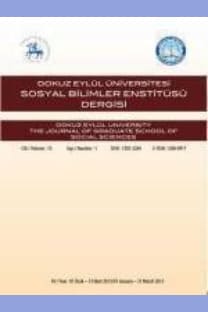İŞLETMELERDE AHLAKİ OLMAYAN DAVRANIŞLARIN DUYURULMASI (WHISTLEBLOWING)
Whistleblowing (duyurma), Hukuki Açıdan Whistleblowing, Çalışanların Korunması
İşletmelerde ahlaki olmayan davranışların duyurulması (whıstleblowıng)
-,
___
- Aydın, U. (2002-2003). İş hukuku açısından işçinin bilgi uçurması (Whistleblowing). Anadolu Üniversitesi Sosyal Bilimler Dergisi, 2 (2): 79-100
- Bouville, M. (2008). Whistle-blowing and morality. Journal of Business Ethics, 81 (3): 579-585
- Chiu, R. K. (2003). Ethical judgement and whistleblowing intention: examining the moderating role of locus of control. Journal of Business Ethics, 43 (1-2): 65-74
- Corpus Mevzuat ve İçtihat Programı, www.corpus.com.tr, (14.10.2011; 25.10.2011)
- Çelik, N. (2011). İş hukuku dersleri, 24. Baskı. İstanbul: Beta Yayınevi
- Dasgupta, S. ve Kesherwani, A. (2010). Whistleblowing: a survey of literature. The IUP Journal of Corporate Governance, 9 (4): 57-70
- Demir, F. ve Demir, G. (2009). İşçinin sadakat borcu ve uygulaması
- Kamu-İş Dergisi, 11 (1): 1-37
- Erdem, M. R. (2009). Suçu bildirmeme suçu (TCK m. 278). Türkiye Barolar Birliği Dergisi, 2009 (80): 105-120
- Ertürk Ş. (2003). İş ilişkisinde temel haklar, 1. Baskı. Ankara: Seçkin Yayınevi
- Gerçek, H. (2005). Mühendislikte etik sorunların ele verilmesi. Madencilik, 44 (4): 29-38
- Gültepe, H. (2005). Yeni Türk Ceza Kanunu’nda ihbar yükümlülüğünün sağlık hukuku yönünden değerlendirilmesi. Kazancı Hukuk Dergisi, 2005 (10): 101-105
- Kaptein, M. (2011). From inaction to external whistleblowing: the influence of the ethical culture of organizations on employee responses to observed wrongdoing. Journal of Business Ethics, 98 (3): 513-530
- Keenan, J. P. (2002). Whistleblowing: a study of managerial differences
- Employee Responsibilities and Rights Journal, 14 (1): 17-32
- King, G. (1999). The implications of an organization’s structure on whistleblowing. Journal of Business Ethics, 20 (4): 315-326
- Larmer R. A. (1992). Whistleblowing and employee loyalty. Journal of Business Ethics, 11 (2): 939-948
- Lewis, D., Ellis, C., Kyprianou, A. ve Homewood, S. (2001)
- Whistleblowing at work: the results of a survey of procedures in further and higher education. Education and The Law, 13 (3): 215-225
- Mesmer-Magnus, J. R. ve Viswesvaran, C. (2005). Whistleblowing in organizations: an examination of correlates of whistleblowing intentions, actions, and retaliation. Journal of Business Ethics, 62 (3): 277-297
- Mollamahmutoğlu, H. (2008). İş hukuku, 3. Baskı. Ankara: Turhan Kitabevi
- Park, H., Rehg, M. T. ve Lee, D. (2005). The influence on Confucian ethics and collectivism on whistleblowing intentions: a study of South Korean public employees. Journal of Business Ethics, 58 (4): 387-403
- Park, H., Blenkinsopp, J., Oktem, M. K. ve Omurgonulsen, U. (2008)
- Cultural orientation and attitudes toward different forms of whistleblowing: a comparison of South Korea, Turkey, and the U.K. Journal of Business Ethics, 82 (4): 929-939
- Qusqas, F. ve Kleiner, B. H. (2001). The difficulties of whistleblowers finding employment. Management Research News, 24 (3/4): 97-100
- Ray, S. (2006). Whistleblowing and organizational ethics. Nursing Ethics, 13 (4): 438-445
- Sökmen, A. ve Tarakçıoğlu, S. (2011). Mesleki etik. Ankara: Detay Yayıncılık
- Tavakoli A. A. (2003). Culture and whistleblowing an empirical study of Croation and US managers utilizing Hofstede’s cultural dimensions. Journal of Business Ethics, 43 (1): 49-64
- Tsahuridi, E. ve Vandekerckhove, W. (2008). Organizational whistleblowing policies: making employees responsible or liable?. Journal of Business Ethics, 82 (1): 107-118
- Tikici, M. (2005). Örgütsel davranış boyutlarından seçmeler, 1. Baskı
- Ankara: Nobel Yayınları
- Uşan, M. F. (2003). İş hukukunda iş sırrının korunması, 1. Baskı. Ankara: Seçkin Yayınevi
- Velasquez, M.(2002). Business ethics concepts and cases. New Jersey: Prentice Hall
- ISSN: 1302-3284
- Yayın Aralığı: 4
- Başlangıç: 1999
- Yayıncı: Dokuz Eylül Üniversitesi Sosyal Bilimler Enstitüsü
“Modernliğin arka yüzü” olarak gündelik hayat: Aşkı memnu
İşletmelerde ahlaki olmayan davranışların duyurulması (whıstleblowıng)
Der einfluss der erstsprache als ein motivationsfaktor auf den erfolg beim fremdsprachenlernen
Max weber'in yorumunda meslek ahlakı olarak dünyevi asketikizm
İŞLETMELERDE AHLAKİ OLMAYAN DAVRANIŞLARIN DUYURULMASI (WHISTLEBLOWING)
Opsiyon duyarlılık parametrelerinin incelenmesine yönelik bir araştırma
